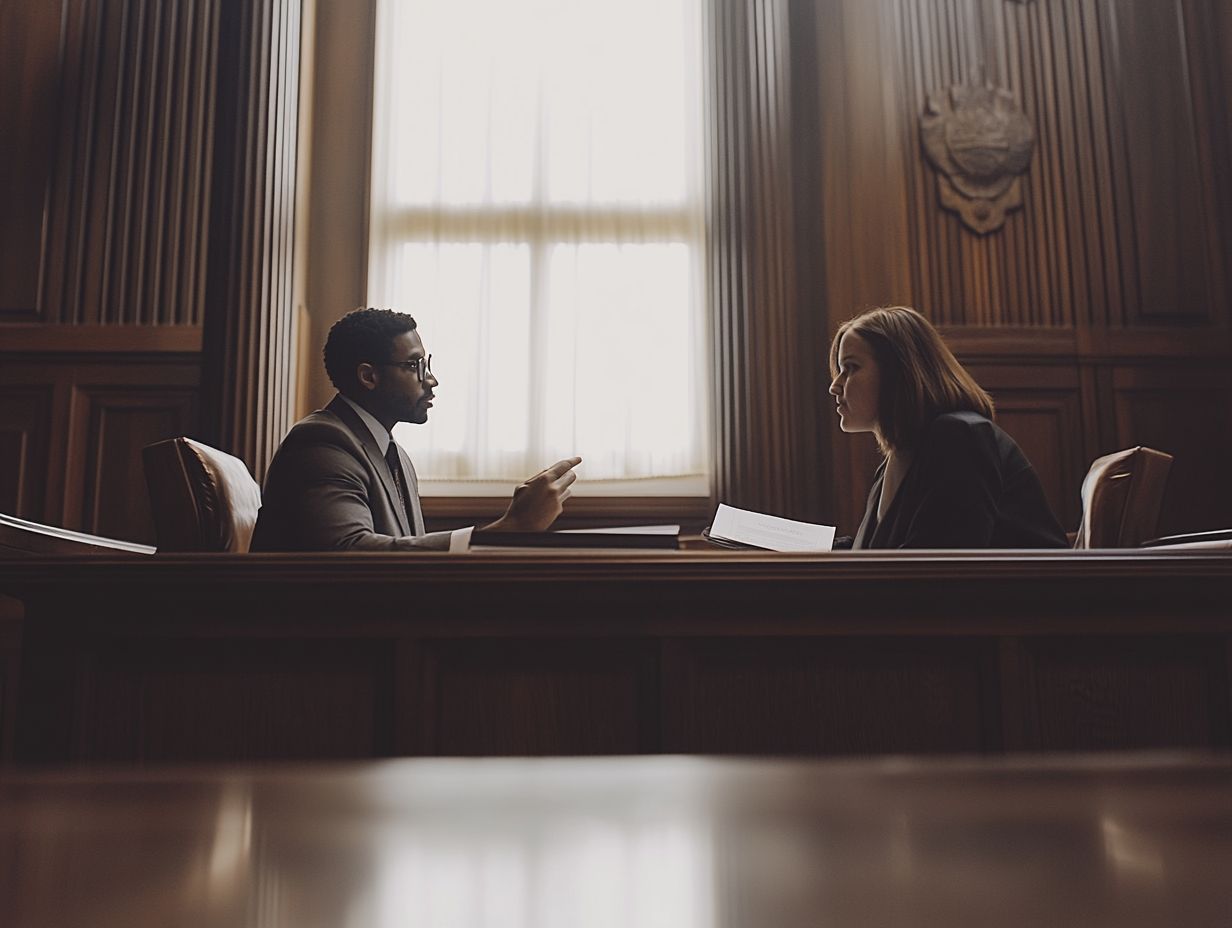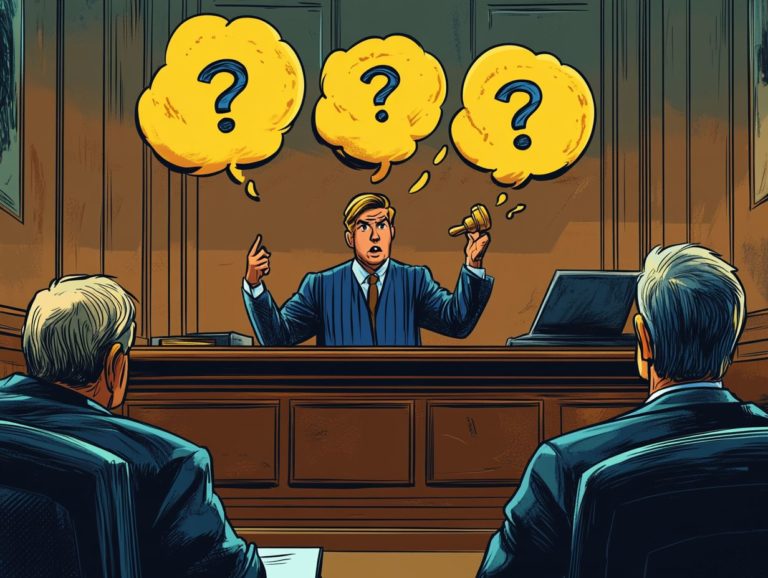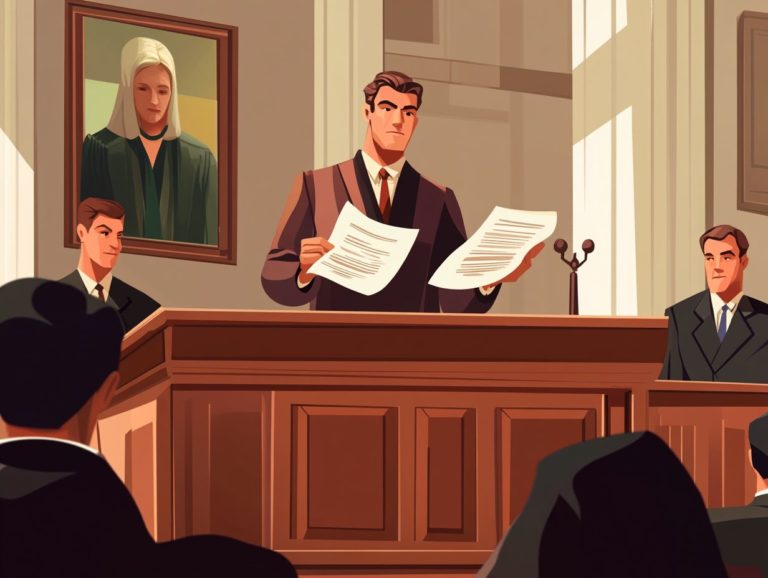Understanding Post-Conviction Defense Options
Navigating the legal system can be overwhelming. This is especially true after a conviction.
Post-conviction defense serves as a vital lifeline for those who wish to challenge their verdicts or seek relief from harsh sentences. This article delves into the various options available after a conviction, such as appeals and writs. It will also highlight how important an attorney is and the critical considerations you should keep in mind throughout this process.
Whether you find yourself directly involved or are simply curious about the nuances of the justice system, this guide will empower you to explore your options for pursuing justice after a conviction.
Contents
- Key Takeaways:
- Types of Post-Conviction Relief
- Grounds for Post-Conviction Relief
- Challenging a Conviction
- Sentencing Modifications
- The Role of an Attorney in Post-Conviction Defense
- Important Considerations for Post-Conviction Defense
- Frequently Asked Questions
- What are post-conviction defense options?
- What are some common post-conviction defense options?
- When should I consider pursuing post-conviction defense options?
- Do I need a lawyer to pursue post-conviction defense options?
- Are there time limits for pursuing post-conviction defense options?
- What is the likelihood of success with post-conviction defense options?
Key Takeaways:
- Post-conviction defense includes options like appeals and writs.
- Key arguments can involve proving innocence or challenging sentences.
- An experienced attorney is crucial for navigating these processes.

What is Post-Conviction Defense?
Post-conviction defense is a vital component of the criminal justice system. It offers you the opportunity to challenge your conviction and pursue options after a guilty verdict.
This area of law is essential for protecting your individual liberties, allowing those who have been wrongfully convicted to scrutinize the integrity of their trial outcomes.
You have various mechanisms at your disposal, such as the appeals process outlined in state statutes and federal rules. These enable the review of the legal procedures and evidence presented during your original trial.
Motions to vacate judgments are crucial tools for addressing serious issues, like prosecutorial misconduct or new evidence that could exonerate you.
Having skilled legal representation is crucial. An experienced attorney can expertly navigate the complex landscape of post-conviction defense, ensuring that your procedural rights are upheld and that justice is ultimately realized.
Types of Post-Conviction Relief
You have several avenues for seeking post-conviction relief to challenge your convictions. These include the writ of habeas corpus, motions for relief under 28 U.S.C. 2255, and collateral attacks on judgments.
Each option targets different facets of a conviction, from procedural missteps to ineffective representation. All of these are vital for upholding justice and fairness in the legal system.
The federal court system offers pathways for you to pursue these remedies, often with the guidance of skilled appeals attorneys who specialize in the intricate world of post-conviction law.
Appeals, Writs, and Other Options
You have several options for seeking post-conviction relief. This includes filing a direct appeal against your conviction, submitting a writ of habeas corpus, or pursuing a collateral attack on your judgment.
Each option comes with its own set of procedural requirements and timelines that must be followed to validate your claim.
The appeals process, especially in federal circuits, can be complex. It requires nuanced legal arguments, underscoring the importance of grasping specific grounds for appeal and identifying any legal errors that may have occurred during your trial.
Navigating these legal paths demands a solid understanding of procedural laws and the ability to pinpoint viable grounds for challenging your conviction. A direct appeal typically focuses on errors made during the trial, while a writ of habeas corpus often tackles unlawful detention or constitutional violations. Collateral attacks might introduce new evidence or argue that your previous representation was ineffective.
Given the intricate nature of jurisdictional rules and the strict deadlines you ll encounter, it s wise to consult with knowledgeable legal counsel. This will empower you to make informed decisions every step of the way.
Grounds for Post-Conviction Relief
Several grounds may warrant post-conviction relief, including legal errors that transpired during the trial, sentencing mistakes, ineffective assistance of counsel, and newly discovered evidence that could significantly alter the case’s outcome.
Each of these grounds presents a unique opportunity for you to challenge your conviction and seek court review, safeguarding your rights within the criminal law framework. Grasping these grounds is crucial for effectively navigating the appeals process and maximizing your chances of achieving a favorable outcome in your pursuit of justice.
Common Legal Arguments

In post-conviction relief cases, you ll often encounter common legal arguments centered around claims of ineffective assistance of counsel, procedural errors, and violations of legal standards that may have been overlooked during the original trial.
These arguments seek to illuminate shortcomings in the legal representation provided by defense attorneys or to draw attention to significant oversights in trial procedures that could have influenced the verdict.
For example, you might find a defendant arguing that their attorney neglected to investigate crucial evidence, such as eyewitness testimonies or alibi witnesses, which could have dramatically shifted the case’s outcome.
Procedural errors, like incorrect jury instructions or the admission of prejudicial evidence, can also provide grounds for appeal, especially if they undermine the trial s integrity.
Defendants deserve effective legal help. If this isn t provided, it raises serious questions about the conviction. These arguments are vital, not just for rectifying individual cases but also for preserving the integrity of the entire judicial system.
Challenging a Conviction
Challenging a conviction is no simple task; it demands that you prove your innocence or show that the evidence presented during your trial fell short of justifying a guilty verdict.
You must closely review your court records immediately to understand your case better. More importantly, having skilled legal representation is essential to adeptly navigate the complexities of the appeals process.
Successfully contesting a conviction not only seeks to overturn the judgment of guilt but also aims to restore your civil rights through the legal remedies available to you.
Proving Innocence or Insufficient Evidence
Proving your innocence or demonstrating that the evidence was insufficient to sustain a conviction is often the cornerstone of your post-conviction relief efforts. This may involve presenting new evidence that wasn t available during your original trial, crafting a compelling basis for court review.
In these situations, the expertise of a knowledgeable criminal defense attorney becomes essential. They can effectively articulate your arguments and expertly navigate the legal landscape to challenge your conviction.
These skilled professionals employ a variety of strategies, such as gathering witness testimonies, scientific evidence collected at a crime scene, and expert opinions, to construct a strong case that could lead to your exoneration.
They meticulously scrutinize procedural errors and potential violations of your rights that might have occurred during the initial trial. Introducing new evidence not only bolsters your appeal but also reinforces the integrity of the legal system, ensuring that justice is served.
Ultimately, your pursuit to prove innocence emphasizes the judiciary’s responsibility to uphold fair trials and protect individual rights.
Sentencing Modifications
Sentencing modifications provide you with a valuable opportunity to reduce or alter your sentence after a conviction, grounded in various legal standards and procedural nuances.
This process involves presenting compelling arguments about sentencing errors or substantial changes in circumstances that justify a reevaluation of the original sentence imposed by the court.
By grasping the legal framework surrounding sentencing modifications, you can effectively advocate for fairer outcomes and establish a strong case for adjusting your punishment.
Reducing or Changing a Sentence
Reducing or altering a sentence is possible through various legal remedies, often requiring the expertise of an experienced appeals attorney who understands the details of sentencing rules in federal cases.
This legal acumen is essential, as the small details in federal sentencing can significantly influence the outcomes of modification requests.
By carefully evaluating the specifics of your case and synthesizing relevant precedents, your attorney can work hard for you. It s crucial for defendants to comprehend the implications of current laws and how changes in legislation may create opportunities for sentence reevaluation.
Showcasing good behavior while incarcerated or notable life changes can bolster your case for adjustment, ultimately paving the way toward a more optimistic future.
The Role of an Attorney in Post-Conviction Defense

An attorney plays a vital role in post-conviction defense. They provide the legal help you need to pursue post-conviction options.
A skilled appeals attorney will adeptly navigate the intricate legal landscape, protecting your rights and diligently working to rectify any injustices that may have arisen during the trial.
Their commitment to upholding due process in the criminal justice system is unwavering. With their expertise, you can effectively challenge wrongful convictions and pursue avenues for relief rooted in legal standards and compelling evidence.
How an Attorney Can Help
An attorney can profoundly influence the post-conviction defense process, offering essential legal representation that gives you the power to understand your rights and navigate the intricate procedural landscape.
Appeals attorneys use their knowledge to find potential grounds for relief, gather new evidence, and craft compelling arguments aimed at addressing wrongful convictions or improper sentencing. Their role is crucial to protect your rights and freedom!
By carefully analyzing trial transcripts and relevant case law, legal professionals can uncover discrepancies that might have gone unnoticed during the initial proceedings. They engage with witnesses to obtain statements that could bring fresh perspectives to your case.
Moreover, post-conviction attorneys play a crucial role in leveraging advancements in forensic science, which may reveal new evidence or challenge the validity of existing proof. This comprehensive approach not only pursues the reversal of unjust outcomes but also upholds the integrity of the justice system, ensuring you have a fair chance for reevaluation.
Ultimately, their dedicated efforts contribute to a system where justice prevails, fostering trust within the community and enhancing the overall legal process.
Important Considerations for Post-Conviction Defense
When engaging in post-conviction defense, several critical considerations demand your attention. You must be mindful of time limits for filing appeals, the admissibility of new evidence, and the legal standards that govern the entire process.
Grasping these factors is essential to prevent procedural missteps that could undermine a defendant’s chances for relief, ensuring that the principles of due process are upheld during the appeals process. Navigating these complexities with precision can dramatically influence the outcome of a post-conviction case.
Act quickly to secure the best possible outcome!
Time Limits, Evidence, and Other Factors
Time limits are absolutely pivotal in the effectiveness of post-conviction defense. It s essential to stay acutely aware of the deadlines for filing appeals and motions for relief.
When new evidence comes into play, it can dramatically alter the trajectory of your case. This emphasizes the necessity of understanding the legal remedies at your disposal.
The intersection of time constraints and the potential for newly discovered evidence highlights the critical need for proactive legal action in your pursuit of judicial review.
If you miss these time limits, you risk forfeiting your rights and may no longer have the opportunity to contest your convictions.
When new evidence surfaces especially evidence that could exonerate you or reduce your responsibility navigating the procedural nuances for its admission becomes vital.
This dynamic affects your chances for post-conviction relief and underscores the importance of informed and timely legal strategies.
By grasping these factors, you empower yourself to advocate effectively for your interests and potentially secure a more favorable outcome in your case.
Frequently Asked Questions
What are post-conviction defense options?

Post-conviction defense options refer to the legal strategies and procedures that can be pursued after a person has been convicted of a crime. These options are available to individuals who have exhausted their appeals and are seeking to challenge their conviction or sentence.
What are some common post-conviction defense options?
Some common post-conviction defense options include filing a motion for a new trial, filing a motion to vacate the conviction or sentence, and filing a habeas corpus petition. (Habeas corpus is a legal action through which a person can seek relief from unlawful detention.) These options may vary depending on the state and the specific circumstances of the case.
When should I consider pursuing post-conviction defense options?
You should consider pursuing post-conviction defense options if you believe that your conviction or sentence resulted from a legal error, new evidence has emerged that could prove your innocence, or your constitutional rights were violated during the trial or sentencing process.
Do I need a lawyer to pursue post-conviction defense options?
While it is possible to pursue post-conviction defense options without a lawyer, it is highly recommended to seek the assistance of a qualified and experienced criminal defense attorney. They can help you navigate the complex legal process and increase your chances of success.
Are there time limits for pursuing post-conviction defense options?
Yes, there are time limits for filing post-conviction motions and petitions, which vary by state. Act quickly! Consult with a lawyer right after your conviction to avoid missing any deadlines.
What is the likelihood of success with post-conviction defense options?
The likelihood of success with post-conviction defense options depends on various factors, including the strength of your case, the evidence available, and the state’s legal system. It is best to consult with a lawyer to assess your chances of success based on your specific circumstances.
Don t wait! Reach out to a lawyer today to discuss your post-conviction options.






